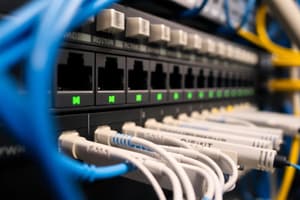Podcast
Questions and Answers
Match the following network terms with their descriptions:
Match the following network terms with their descriptions:
Physical Network = Physically connecting devices to one another IP: Internet Protocol = Uniquely identifying people on the internet and routing messages between them TCP: Transmission Control Protocol = Sending large messages over the Internet when accuracy is most important Packets = Messages divided into smaller units for transmission over the network
Match the following components of the network with their functions:
Match the following components of the network with their functions:
Routers = Use IP addresses to move data along a path of direct connections Fiber optic cables, wifi signals, or copper wires = Physically connect the computers, smart phones, servers, etc. that make up the Internet IP addresses = Uniquely identify devices on the internet Packets = Numbered units of data that are sent over the internet
Match the following network protocols with their characteristics:
Match the following network protocols with their characteristics:
TCP = Used when accuracy is most important in sending large messages over the Internet IP = Uniquely identifies devices on the internet and is used for routing messages between them Dynamic Routing = Path of data transmission is unpredictable and changes based on network conditions UDP = An alternative to TCP for sending messages over the Internet
Match the following network concepts with their definitions:
Match the following network concepts with their definitions:
Match the following network elements with their roles:
Match the following network elements with their roles:
Flashcards are hidden until you start studying
Study Notes
Network Terms and Descriptions
- Network terms can be matched with their descriptions to understand the underlying concepts of computer networking
- This matching process helps to identify and clarify the meanings of various network-related terms
Network Components and Functions
- Network components can be matched with their functions to understand the role of each component in the network
- This matching process helps to identify the purpose and operation of devices such as routers, switches, and modems
Network Protocols and Characteristics
- Network protocols can be matched with their characteristics to understand the communication rules and standards of the network
- This matching process helps to identify the features and behaviors of protocols such as TCP/IP, HTTP, and FTP
Network Concepts and Definitions
- Network concepts can be matched with their definitions to understand the abstract ideas and principles of computer networking
- This matching process helps to identify the meanings of concepts such as network topology, bandwidth, and latency
Network Elements and Roles
- Network elements can be matched with their roles to understand the part each element plays in the network
- This matching process helps to identify the responsibilities of elements such as firewalls, routers, and servers
Studying That Suits You
Use AI to generate personalized quizzes and flashcards to suit your learning preferences.




